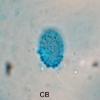
05-02-2026 15:07
Found on a fallen needle of Pinus halepensis, diam

05-02-2026 06:43
Stefan BlaserHello everybody, Any help on this one would be mu

18-08-2025 15:07
 Lothar Krieglsteiner
Lothar Krieglsteiner
.. 20.7.25, in subarctic habital. The liverwort i

02-02-2026 21:46
Margot en Geert VullingsOn a barkless poplar branch, we found hairy discs

02-02-2026 14:55
 Andgelo Mombert
Andgelo Mombert
Bonjour,Sur thalle de Lobaria pulmonaria.Conidiome

02-02-2026 14:33
 Andgelo Mombert
Andgelo Mombert
Bonjour,Sur le thalle de Peltigera praetextata, ne

31-01-2026 10:22
 Michel Hairaud
Michel Hairaud
Bonjour, Cette hypocreale parasite en nombre les

02-02-2026 09:29
 Bernard CLESSE
Bernard CLESSE
Bonjour à toutes et tous,Pour cette récolte de 2

01-02-2026 19:29
 Nicolas Suberbielle
Nicolas Suberbielle
Bonjour, Marie-Rose D'Angelo (Société Mycologiq
A dark peziza...
Martin Bemmann,
24-09-2010 23:40
 Bonsoir and good evening,
Bonsoir and good evening,I got some collections of pezizas from a friend for determination. I am not very familiar with this genus since my forest is on acid ground (sandstone) and I do find them rarely. But she lives in a calcareous region (close by) and collects them in abundance.
I stuck up with determination right at the first specimen. I went through different keys (Hohmeyer, Nordic Macromycetes) and stranded allways at P. lividula. Which doesn't fit, at least considering shape of spores beeing not fusiform or subf. at all. My problem with those keys is that my specimen doesn't show any milk/latex. They were harvested only few days ago and kept refrigerated.
So here is what I have:
Apothecia are blackish darkbrown with a distinct purple to violaceous tint, up to 4.5 cm in dm.
Asci are IKI+ and c. 375x15.5 µm in size.
Paraphyses are septated and slightly moniliform (are they?) with a medium width of 6.5 µm, with some
yellow-brownish drops in the slightly clavate apical section.
Asci are ovoid with predominantly one oildrop and covered with an even ornamentation of rounded warts (16.6-18.1 x 9-10.5 µm).
What I have seen of the textura of the excipulum was a globulosa.
I will be happy to hear some suggestions. Maybe it is just a trivial one...
Best regards,
Martin
And now some pictures:
René Dougoud,
25-09-2010 07:35
Re:A dark peziza...
Cher Collègue,
Il s'agit très probablement de Peziza depressa Pers.: Fr.
La couleur de l'hyménium est assez type, brun rougeâtre. Sur le frais et les spécimens normalement hydratés, la chair exsude un liquide hyalin, assez abondant. Microscopiquement, les ascospores présentent des verrue arrondies et aussi pointues, avec une grande guttule. Les dimensions données sont correctes pour cette espèce. Le médulla est de texture intricata et l'exc. ectal t. angularis.
Cordialement
René
Il s'agit très probablement de Peziza depressa Pers.: Fr.
La couleur de l'hyménium est assez type, brun rougeâtre. Sur le frais et les spécimens normalement hydratés, la chair exsude un liquide hyalin, assez abondant. Microscopiquement, les ascospores présentent des verrue arrondies et aussi pointues, avec une grande guttule. Les dimensions données sont correctes pour cette espèce. Le médulla est de texture intricata et l'exc. ectal t. angularis.
Cordialement
René
Martin Bemmann,
25-09-2010 16:06

Re:A dark peziza...
Dear René,
thank you very much! This description fits very good to this collection.
Best regards,
Martin
thank you very much! This description fits very good to this collection.
Best regards,
Martin
Martin Bemmann,
26-09-2010 18:03

Re:A dark peziza...
Addendum:
I don't want to blame the keys I used, I have just ignored (not seen) the junction 39d in Hohmeyer's key...
Best regards,
Martin
I don't want to blame the keys I used, I have just ignored (not seen) the junction 39d in Hohmeyer's key...
Best regards,
Martin






